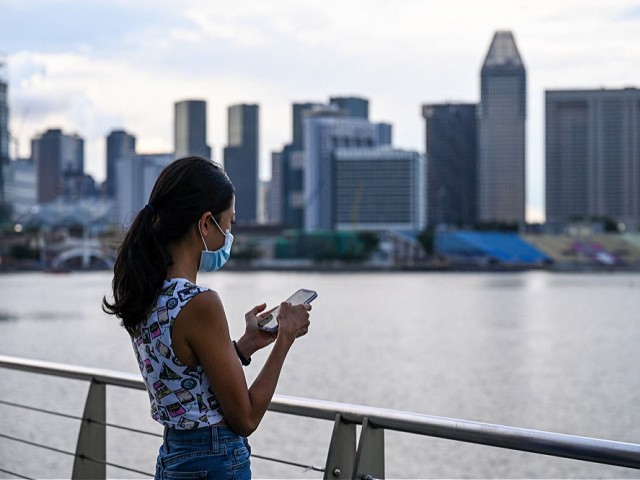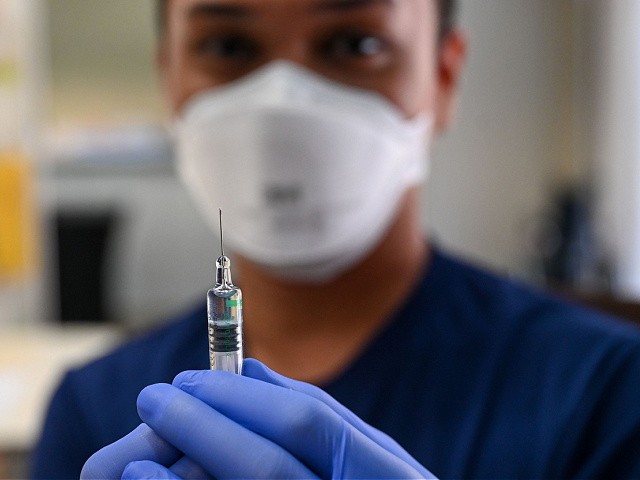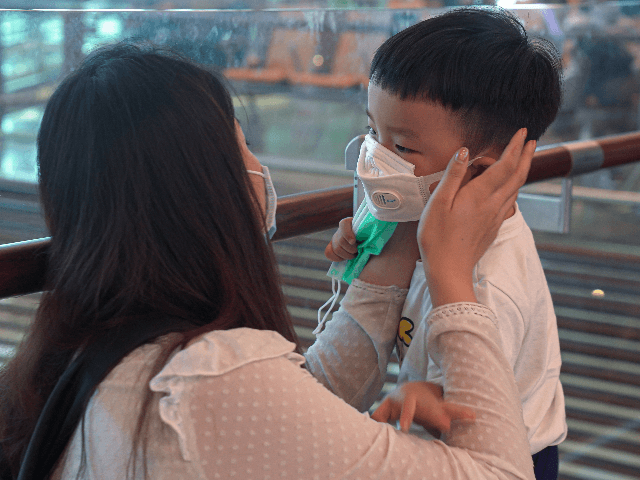Singapore’s Health Ministry said Wednesday it was investigating an “unusual surge” in the city-state’s new daily cases of the Chinese coronavirus, which hit a record high of 5,324 earlier Wednesday.
“The infection numbers are unusually high today, mostly due to many COVID-positive cases detected by the testing laboratories within a few hours in the afternoon,” the Health Ministry said in a statement issued October 27.
“The Ministry of Health is looking into this unusual surge in cases within a relatively short window, and closely monitoring the trends for the next few days,” the statement read.
The Republic of Singapore, which has a population of 5.45 million, recorded ten deaths from the Chinese coronavirus on October 27.
“Wednesday [October 27] marks the 38th day in a row with fatalities from COVID-19 [Chinese coronavirus] reported in Singapore, with 248 people having succumbed to it this month,” Yahoo News Singapore observed.

This picture, taken on May 7, 2021, shows a woman checking her mobile phone along the Marina Bay promenade in Singapore. (Roslan Rahman/AFP via Getty Images)
Of the 5,324 new coronavirus cases documented in Singapore on Wednesday, “5,312 are local infections: 4,651 are in the community and 661 reside in the migrant worker dormitories. The remaining 12 are imported,” according to the news outlet.
Singapore’s weekly infection growth rate for the Chinese coronavirus is 1.15, according to updated data published by the republic’s Health Ministry on Wednesday.
“[O]ver the past seven days, the number of fully vaccinated and non-fully vaccinated cases who are critically ill in the ICU [Intensive Care Unit] are at 0.5 and 4.3 per 100,000 population, respectively,” Singapore health officials said on October 27.
“Over the same period, the number of fully vaccinated and non-fully vaccinated cases who died are 0.1 and 0.8 per 100,000 population, respectively,” according to the Health Ministry.
“Among those aged 60 and above, the number of fully vaccinated and non-fully vaccinated cases who are critically ill in the ICU are 2.2 and 32.6, respectively,” the Singapore government health data revealed.
“The number of fully vaccinated and non-fully vaccinated seniors who died are 0.3 and 7.7, respectively,” the Health Ministry added.
Singapore’s recent spike in new coronavirus cases has surprised the Asian republic’s health officials and foreign observers, as the city-state has an 84 percent rate of vaccination against the Chinese coronavirus. According to Singapore’s government, 14 percent of the republic’s population has received “booster shots” of coronavirus vaccines as of October 27. “Booster shots” are additional doses of a vaccine administered to a patient after he or she has already completed the full dosage of an inoculation.
“A total of 10,029,148 doses have been administered in Singapore under the national vaccination programme as at Oct 26 [sic]. Both first and second doses of the Pfizer-BioNTech/Comirnaty, Moderna and Sinovac vaccines are currently being administered,” the Straits Times reported on October 28 via its regularly updated “Tracking Singapore’s Covid-19 vaccination progress” page. Singapore launched its national coronavirus vaccine drive on July 2.

A nurse prepares a dose of the Sinopharm coronavirus vaccine at the Mount Elizabeth hospital vaccine centre in Singapore on September 7, 2021. (Roslan Rahman/AFP via Getty Images)
The same vaccine tracker page published by the Straits Times omitted Sinovac as one of Singapore’s government-approved coronavirus vaccine offerings as recently as October 20, writing, “Both first and second doses of the Pfizer-BioNTech/Comirnaty and Moderna vaccines are currently being administered.”
Pfizer and BioNTech said in April they believed its Chinese coronavirus vaccine, Comirnaty, demonstrated an efficacy rate as high as 91 percent against the disease. Further studies since April suggest the efficacy rate of Comirnaty, and other coronavirus vaccines that rely on mRNA technology, may wane after a period of a few to several months.
“[A] study [published on July 28], not yet peer-reviewed, provided more new data that brought the efficacy number down to 84 percent after 6 months, although efficacy against severe disease was 97 percent,” Yale Medicine reported of Comirnaty on October 15.
“In August, the [U.S.] CDC [Centers for Disease Control and Prevention] also published studies that showed mRNA vaccine protection against infection may be waning, although the vaccines were still highly effective against hospitalization,” the medical news site noted. “In one CDC study, data from the state of New York showed vaccine effectiveness dropping from 91.8 to 75 percent against infection.”
Sinovac’s CoronaVac vaccine managed to receive an “emergency use approval” from the World Health Organization (W.H.O.) in June despite its low efficacy rate of 51 percent.
Pfizer is a U.S.-based multinational pharmaceutical and biotech corporation that partnered with BioNTech, a German biotech company, and China’s Fosun Pharma to develop Comirnaty. Pfizer-BioNTech’s coronavirus vaccine utilizes mRNA technology, as does that made by Moderna, a U.S.-based pharmaceutical and biotech company. Sinovac is a Chinese state-run biopharmaceutical company that produces a Chinese coronavirus vaccine called “CoronaVac.” Sinovac’s inactivated vaccine offering “works by using killed viral particles to expose the body’s immune system to the virus without risking a serious disease response,” according to the BBC.
Pfizer and Moderna’s mRNA vaccines differ from Sinovac in that they inject part of the Chinese coronavirus’s genetic code into the recipient’s body, triggering it to produce viral proteins. This process subsequently trains the recipient’s immune system to attack the coronavirus.

COMMENTS
Please let us know if you're having issues with commenting.